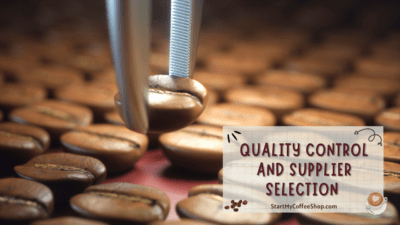Starting a coffee shop business requires careful planning and strategic decision-making. From choosing the right location to designing an appealing ambiance, every aspect plays a crucial role in attracting customers and ensuring your spot in the coffee industry.
By considering factors such as location selection, target audience, menu development, branding, marketing strategies, and operational efficiency in your decision-making, you can create a coffee shop that resonates with customers and stands out in the competitive market.
In this article, I will discuss key decisions that should be considered when creating a coffee shop business plan. By optimizing these decisions, you can maximize your chances of building a thriving coffee shop that stands out in a competitive market.
Location Selection

Choosing the ideal location is a crucial choice that can have a significant impact on your coffee shop’s performance. Your exposure, accessibility, and consumer reach will all depend on the site you pick. To guarantee you make the best decision, it is crucial to take into account a variety of aspects.
Start by examining the foot traffic in each of the potential locations. Look for busy regions with a lot of people going by, such as commercial districts, popular neighborhoods, or busy streets. These locations can draw potential consumers and improve your coffee shop’s visibility.
Furthermore, consider the level of competition in the area. While some competition can be healthy, an oversaturated market may pose challenges. Research existing nearby coffee shops and assess their offerings, pricing, and customer base. Finding a location where you can differentiate yourself and provide a unique value proposition will give you a competitive edge.
Additionally, analyze the demographic composition of the area. Understand the age groups, income levels, and cultural preferences of the local population. Ensure that the area aligns with your target market and that there is sufficient demand for your coffee offerings. This information can guide your marketing efforts and help tailor your menu and ambiance to appeal to the local customer base.
Read more about: Coffee Bar Startup Cost: The Road to Java Joy
Market Analysis and Target Audience
A thorough market analysis is an essential part of your business plan for your coffee shop. By performing in-depth research, you may better understand the local coffee market and adjust your offers to appeal to your target market.
Determine your target market first. Establish the age, income, and lifestyle preferences of your potential clients to determine their demographic profile. You can better grasp their unique coffee needs and preferences with the aid of this information.
Next, explore the preferences within the coffee industry. Research popular trends such as specialty coffee, organic products, or unique brewing techniques. Determine if there is a growing demand for these offerings in your area. This understanding will allow you to curate a menu that resonates with your target audience, ensuring a strong connection with their preferences.
Moreover, pricing is a critical aspect to consider. Analyze the price ranges of existing coffee shops in your area and align your pricing strategy accordingly. Striking the right balance between affordability and perceived value will help attract customers and maximize profitability.
Finally, develop effective marketing strategies based on your market analysis. Identify the most suitable channels to reach your target audiences, such as social media platforms, local events, or collaborations with other businesses. Craft compelling messages that highlight the unique aspects of your coffee shop, emphasizing the features that resonate with your customer preferences.
Menu Development and Specialty Offerings
Decide on the essential coffee options for your menu to start. Numerous espresso-based beverages, brewed coffee selections, and specialty drinks like lattes, cappuccinos, and mochas are often included in this. Concentrate on striking a balance between time-tested favorites and cutting-edge inventions to satisfy a variety of palates.
If you want to differentiate yourself from the competition, think about using unusual flavors or regionally obtained components. Create a unique coffee experience that guests won’t find anywhere else by experimenting with distinctive syrups, seasonal tastes, or specialty beans. To improve how people perceive your offerings, emphasize the source and caliber of the ingredients.
In addition to coffee, expanding your menu to include a selection of pastries, sandwiches, or healthy snacks can broaden your customer base. Consider offering options for different dietary preferences, such as gluten-free or vegan choices, to accommodate a diverse range of customers. Providing high-quality food options that pair well with your coffee can enhance the overall experience and increase customer satisfaction.
Branding and Ambiance
Creating a strong brand identity is essential for customer recognition and loyalty. Develop a unique name, logo, and visually appealing interior design that aligns with your target audience. Choose a theme, color palette, and décor that evoke the desired ambiance, whether it’s a cozy hangout spot or a vibrant social hub. Invest in comfortable seating, cozy lighting, and soothing music to enhance the overall experience.
Read more about: Coffee Bar Business Start-Up Costs: Navigating the Financial Landscape
Equipment and Technology
Investing in high-quality equipment is essential for your coffee shop as it directly impacts the quality of the coffee you serve and the efficiency of your operations. Carefully select espresso machines, grinders, and brewers that align with your business volume and budget. This ensures that you can consistently deliver exceptional coffee to your customers.
Incorporate technology into your business in addition to coffee-making equipment. Utilizing a contemporary point-of-sale (POS) system enables effective order processing, inventory control, and revenue tracking. Customers may easily place orders for pickup or delivery via online ordering platforms, which increases customer happiness and broadens your reach. You may increase client loyalty and encourage repeat business by implementing loyalty programs.
When choosing equipment and technology solutions, consider their long-term value and scalability. Select durable and reliable equipment that can withstand high-demand usage. Similarly, opt for technology solutions that can adapt and grow with your business as you expand and evolve.
Staffing and Training
Selecting the right staff members and providing comprehensive training is vital for delivering excellent customer service. Hire passionate individuals who are knowledgeable about coffee and prioritize customer satisfaction. Train your staff on coffee brewing techniques, menu items, and customer interaction to ensure consistent quality and a positive customer experience.
Marketing and Promotion
Developing a robust marketing strategy will help attract customers and generate buzz about your coffee shop. Utilize online and offline marketing channels such as social media, local advertising, and partnerships with neighboring businesses. Engage with your customers through content marketing, loyalty programs, and community events to build a loyal customer base.
Financial Planning and Budgeting
When creating your financial plan, consider various factors that contribute to your expenses. These include rent for your location, purchasing or leasing equipment, acquiring necessary supplies, staff wages, and marketing expenses. Carefully research and obtain accurate cost estimates for each of these elements to ensure the accuracy of your budget.
Conducting thorough market research is essential for determining realistic revenue projections. Analyze the coffee industry in your area, including the demand for coffee, customer spending habits, and competition. By understanding the market dynamics, you can make informed decisions regarding pricing strategies that will enable you to achieve profitability while remaining competitive.
Contingencies and unanticipated costs should also be taken into consideration in your financial plan. It’s crucial to have a cushion to deal with unforeseen expenses or brief company downturns.
Maintain a financial strategy that is regularly reviewed and updated as your coffee business expands and changes. Assess your company’s financial situation and make the required corrections to maximize profitability by comparing your actual expenses and income to your estimates.
Quality Control and Supplier Selection 
Maintaining consistent quality in your coffee and food offerings is essential for customer satisfaction. Choose reliable suppliers who provide high-quality coffee beans, fresh ingredients, and other necessary supplies. Regularly evaluate your suppliers to ensure they meet your standards and offer competitive pricing. Implement quality control measures to monitor the taste, presentation, and overall experience your coffee shop delivers.
Read more about: Coffee Bar Business Plan: Crafting a Unique Caffeine Experience
Sustainable Practices
In today’s environmentally conscious world, incorporating sustainable practices into your coffee shop can attract eco-conscious customers and differentiate your business. Consider using eco-friendly packaging, implementing recycling programs, and sourcing coffee beans from fair trade and sustainable farms. Communicate your commitment to sustainability through signage and online platforms to resonate with socially responsible consumers.
Competitive Analysis
Analyze your competitors to identify their strengths, weaknesses, and unique selling points. Study their pricing strategies, menu offerings, customer service, and marketing tactics. Differentiate your coffee shop by offering something unique, whether it’s a signature beverage, a cozy atmosphere, or exceptional customer service. By understanding your competition, you can position your coffee shop effectively and offer a compelling value proposition to your customers.
Customer Feedback and Continuous Improvement
Listening to your customers’ feedback is crucial for improving your coffee shop’s offerings and operations. Encourage customers to provide feedback through surveys, comment cards, or online reviews. Pay attention to their preferences, suggestions, and areas where you can enhance the customer experience. Regularly review and adapt your business strategies based on customer insights to ensure ongoing customer satisfaction and loyalty.
Regulatory Compliance and Licensing
First and foremost, familiarize yourself with the specific health and safety regulations applicable to food service establishments in your jurisdiction. This includes guidelines for food handling, preparation, storage, and sanitation. Implement strict protocols and procedures to maintain a clean and safe environment for both your staff and customers.
Additionally, get the licenses and permits needed to lawfully run your coffee shop. This could include receipts for serving alcohol (if appropriate), serving food outside, performing music, and more. To make sure you have all the required paperwork in order, research local rules and speak with relevant authorities.
In addition to assisting you in avoiding legal troubles and significant fines, following regulations also fosters customer confidence and trust. Establishing a reputation for upholding high standards of health, safety, and legality will help your coffee shop. Customers will feel more secure knowing that you prioritize their safety and that your business complies with the law.
Regularly review and update your practices to stay up to date with any changes in regulations. This includes conducting self-audits and inspections to identify and address any compliance gaps or areas for improvement. By prioritizing regulatory compliance, you can ensure the sustainability of your coffee shop.
Flexibility and Adaptability
The coffee industry is dynamic, with trends and customer preferences evolving rapidly. Stay updated with the latest industry news, emerging coffee trends, and consumer behaviors. Be prepared to adapt your menu, marketing strategies, and operations to meet changing demands. Embrace flexibility and innovation to stay ahead of the competition and cater to the evolving needs of your customers.
Read more about: Business Plan to Open a Coffee Shop: A Cup of Dreams
Summary
When crafting a coffee shop business plan, making well-informed decisions is essential for establishing an effective venture. A comprehensive and well-executed business plan, coupled with passion and dedication, can pave the way for a thriving coffee shop that becomes a beloved destination for coffee enthusiasts and a hub for the local community.
Frequently Asked Questions
Question: How do I choose the best location for my coffee shop?

Answer: Selecting the right location for your coffee shop involves considering factors such as foot traffic, proximity to your target audience, and competition in the area. Look for high-traffic areas near offices, universities, or shopping centers.
Question: How can I create a unique brand for my coffee shop?
Answer: To create a unique brand for your coffee shop, develop a distinct name, logo, and interior design that align with your target audience. Choose a theme, color palette, and décor that evoke the desired ambiance.
Question: What equipment and technology should I invest in for my coffee shop?
Answer: Investing in quality equipment is crucial for delivering exceptional coffee and maintaining efficient operations. Choose espresso machines, grinders, and brewers that suit your business volume and budget.
To learn more on how to start your own coffee shop, check out my startup documents here.
Disclaimer: The information provided by StartMyCoffeeShop.com (“The Site”) is for general informational purposes only. All information on the Site is provided in good faith. However, we make no representation or warranty of any kind, express or implied, regarding the accuracy, adequacy, validity, reliability, availability, or completeness of any information on the Site. Under no circumstance shall we have any liability to you for any loss or damage of any kind incurred as a result of the use of the Site or Reliance on any information provided on the Site. Your use of the Site and reliance on any information on the Site is solely at your own risk. This blog post is for educational purposes only and does not constitute legal advice. Please consult a legal expert to address your specific needs. Terms and Conditions. (https://startmycoffeeshop.com/terms-and-conditions/)

Hi! I’m Shawn Chun
My adventure in coffee began when I first launched my first coffee shop back in the early 2000s. I had to figure out so many things on my own and to make it worse within 2 years of opening two large corporate coffee chains moved in just blocks away from me!
As I saw smaller and even some larger coffee shops in the neighborhood slowly lose customers to these giant coffee chains and slowly close up shop, I knew that I had to start getting creative…or go out of business.
I (like you may be) knew the coffee industry well. I could make the best latte art around and the foam on my caps was the fluffiest you have ever seen. I even had the best state-of-the-art 2 group digital Nuova Simonelli machine money could buy. But I knew that these things alone would not be enough to lure customers away from the name brand established coffee shops.
Eventually, through lots of trial and error as well as perseverance and creativity I did find a way to not only survive but also thrive in the coffee/espresso industry even while those corporate coffee chains stayed put. During those years I learned to adapt and always faced new challenges. It was not always easy, however, in the end, I was the sole survivor independent coffee shop within a 10-mile radius of my location. Just two corporate coffee chains and I were left after that year. All told the corporate coffee chains took down over 15 small independent coffee shops and kiosks and I was the last one standing and thriving.
Along the years I meet others with the same passion for coffee and I quickly learned that it is not only “how good a barista is” that makes a coffee shop successful, but the business side of coffee as well.
Hence why I started this website you are on now. To provide the tools and resources for up and coming coffee shop owners to gain that vital insight and knowledge on how to start a coffee shop successfully.
Stick around, browse through my helpful blog and resources and enjoy your stay! With lots of LATTE LOVE!
Shawn







